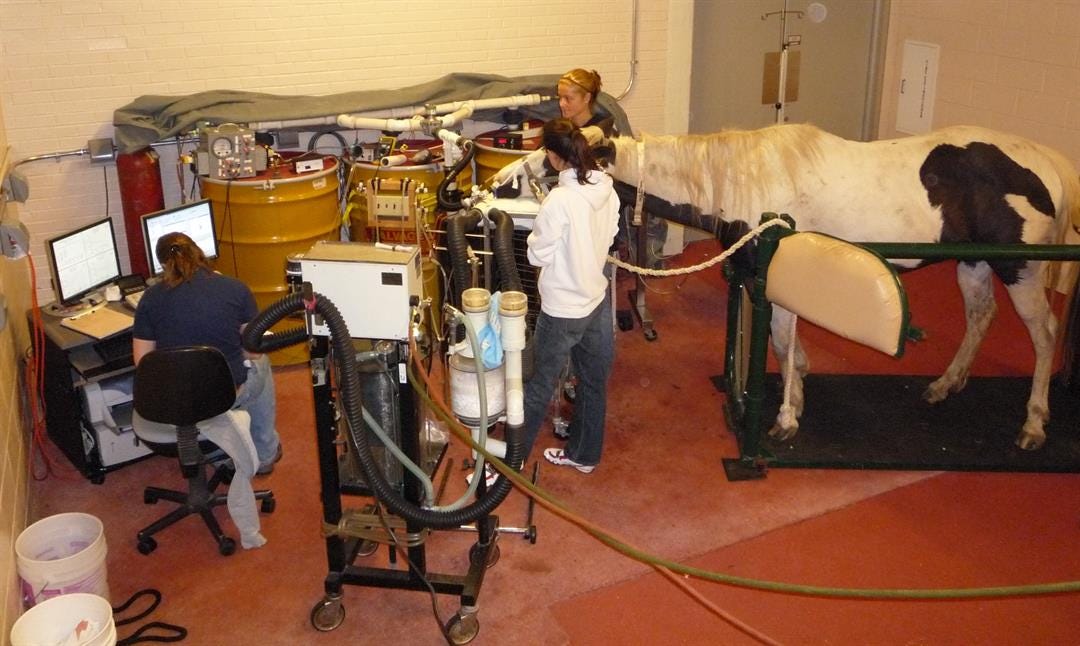Purdue Asthma Test Helps Heal Racehorses
 The test involves connecting the horse's airways to two different tanks; one with positive pressure and the other with negative (like a vacuum).
The test involves connecting the horse's airways to two different tanks; one with positive pressure and the other with negative (like a vacuum).
Subscriber Benefit
As a subscriber you can listen to articles at work, in the car, or while you work out. Subscribe NowIndiana is the only place in the world with a cutting-edge respiratory testing device for horses. Veterinarians and engineers at the Purdue University College of Veterinary Medicine developed the tool to bring clarity to an elusive condition. Behind lameness, respiratory issues are the second-leading cause of an equine athlete’s poor performance, but symptoms are subtle and difficult to spot. The technology is providing answers for owners who begin to question why their horse is slowing down.
Purdue says Indiana’s equine industry is an important piece of the state’s economy, generating about $2 billion annually. Indiana is home to 160,000 equine, valued at more than $795 million, so keeping horses—especially elite athletes—in peak performance condition is a top priority.
Purdue Equine Sports Medicine Center Director Dr. Laurent Couetil notes that a horse’s incredible athleticism is a result of its very large lung capacity and sizable heart. While heart disease is relatively uncommon, lung disease—asthma in particular—is widespread. Couetil says a Purdue study at its Centaur Equine Specialty Hospital in Shelbyville, a satellite clinic opened in 2017, revealed 80 percent of the horses had mild asthma; even mild cases impact athletes’ performance.
“Some of it is because of their diet; many live indoors and the classic diet is hay, which is inherently quite dusty if you compare it to when they’re on pasture eating grass. That dust can make them become asthmatic,” says Couetil. “For a horse with mild asthma, it can be really difficult to identify the problem; you just know they don’t run as well as they used to.”
The College of Veterinary Medicine treats about 1,400 horses each year. Created in Couetil’s lab, the pulmonary function test “has proved to be very sensitive.” The diagnostic tool derives from the standard test for humans with conditions like COPD and asthma.
“[A human] would go to a pulmonologist, and they’ll have you take the deepest breath in that you can and then blow out as hard and completely as you can; they essentially measure how quickly you can blow out air. That’s the so-called forced expiration [test],” says Couetil. “Essentially, what we did was enable that test to be performed in horses; knowing you can’t ask the horse to do the forced expiration, you have to do it for him.”
Couetil’s team collaborated with engineers at Purdue to develop the assisted expiration test—the first of its kind in the world. One key advantage is that horses can be partially sedated while still standing. An apparatus attaches to two different tanks; one tank with positive pressure connects to the horse’s airways to inflate his lungs. Next, a tank with negative pressure (like a vacuum) forces assisted expiration in the horse.
The automated system produces measurements that can diagnose the horse’s respiratory condition. Couetil says, in its current form, the technology requires equipment that’s too large for portability. The test is also “quite involved” and requires specialized expertise. His lab is working to create a more simplified—and smaller—system that could be commercialized for veterinarians to diagnose asthma in the field.
Once identified, Couetil says asthma is relatively easy to treat in horses with medication, special devices similar to what humans use or by switching to commercial pellet feed, rather than relying on hay. While the technology could be adapted for other animals, it would require general anesthesia, which makes it a less attractive option.
The technology adds momentum to a major project at the college; plans are also underway for a new $35 million Large Animal Hospital in 2020.
“The intent would be to have a cutting-edge lung function testing lab at the sports medicine center in that new building,” says Couetil. “That would be the goal.”
The Sports Medicine Center is also one of just a handful of places in the U.S. to have a high-speed treadmill for horses to help diagnose performance issues. Coupled with the new respiratory test and expansion plans, Couetil believes the school will continue to lead the pack in equine health.
Couetil says Purdue’s high-speed treadmill for horses is another critical tool and one of only a few in the country.
Couetil says giving horses commercial feed instead of hay can be a simple solution.
